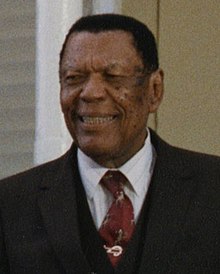
Antigua and Barbuda is a sovereign archipelagic country in the Caribbean. It lies at the conjuncture of the Caribbean Sea and the Atlantic Ocean in the Leeward Islands part of the Lesser Antilles.

The politics of Antigua and Barbuda takes place in a framework of a unitary parliamentary representative democratic monarchy,wherein the sovereign of Antigua and Barbuda is the head of state,appointing a governor-general to act as vice-regal representative in the nation. A prime minister is appointed by the governor-general as the head of government,and of a multi-party system;the prime minister advises the governor-general on the appointment of a Council of Ministers. Executive power is exercised by the government. Legislative power is vested in both the government and the two chambers of the Parliament. The bicameral Parliament consists of the Senate and the House of Representatives.
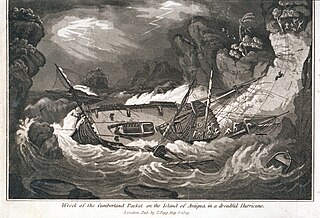
The history of Antigua and Barbuda covers the period from the arrival of the Archaic peoples thousands of years ago to the present day. Prior to European colonization,the lands encompassing present-day Antigua and Barbuda were inhabited by three successive Amerindian societies. The island was claimed by England,who settled the islands in 1632. Under English/British control,the islands witnessed an influx of both Britons and African slaves migrate to the island. In 1981,the islands were granted independence as the modern state of Antigua and Barbuda.
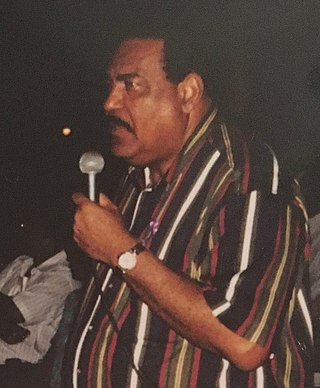
Sir Lester Bryant Bird was an Antiguan politician and athlete who served as the second prime minister of Antigua and Barbuda from 1994 to 2004. He was chairman of the Antigua Labour Party (ALP) from 1971 to 1983,then became prime minister when his father,Sir Vere Bird,the previous prime minister,resigned.

The Antigua and Barbuda Labour Party (ABLP) is a political party in Antigua and Barbuda. The current leader of the party is Gaston Browne,who serves as the Prime Minister of Antigua and Barbuda. The party had previously been led by Lester Bird,who was chairman of the party since 1971,and was Prime Minister and political leader in 1994.
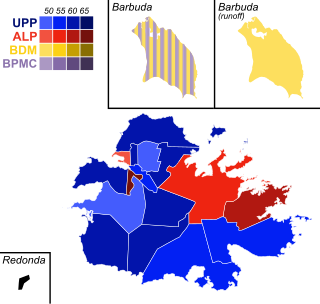
General elections were held in Antigua and Barbuda on 23 March 2004. The result was a victory for the opposition United Progressive Party (UPP),which defeated the incumbent Antigua Labour Party. Baldwin Spencer,leader of the UPP,replaced Lester Bird as Prime Minister of Antigua and Barbuda,with Bird being one of eight Labour MPs to lose his seat. Spencer became only the second Prime Minister from outside the Bird family or the Labour Party.
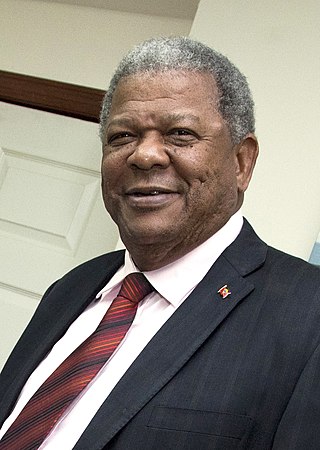
Winston Baldwin Spencer is an Antiguan politician who was the third prime minister of Antigua and Barbuda from 2004 to 2014.

Elections in Antigua and Barbuda take place in the framework of a parliamentary democracy.
Charlesworth Theophilus Samuel was an Antiguan politician.

General elections were held in Antigua and Barbuda on 17 April 1984,the first after the country had become an independent Commonwealth realm in 1981.
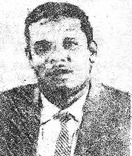
Sir George Herbert Walter,KNH was an Antiguan politician of the Progressive Labour Movement and Premier of Antigua and Barbuda from 14 February 1971 to 1 February 1976.

General elections were held in Antigua and Barbuda on 11 February 1971. They were won by the Progressive Labour Movement. PLM leader George Walter was elected Premier of Antigua,defeating the incumbent Premier Vere Bird of the Antigua Labour Party. The PLM was founded in 1967 after a split in the leadership of the Antigua Trades and Labour Union;this was its first election,as well as its first and only electoral victory.
Sir Robert Hall (1909–1994) was a politician of Antigua and Barbuda. Hall was an opponent of the dominant Antigua Labour Party throughout his career. He was politically active mainly during Antigua and Barbuda's time as a West Indies Associated State.

General elections were held for the first time in Antigua and Barbuda on 26 July 1946. The elections were held under a limited franchise and only those who owned property were permitted to stand for election to the legislature. The Antigua Trades and Labour Union (ATLU) chose five of its members who satisfied the property criteria to stand as labour representatives. All were elected as the union-backed candidates received 82% of the vote.
Vere Bird Jr. was an Antiguan lawyer and politician who served as chairman of the Antigua Labour Party (ALP) and a government minister. He was the son of Vere Bird,the former Prime Minister of Antigua and Barbuda,and brother of Lester Bird,who later held the same position.
Sir Robin Yearwood KGCN is an Antiguan politician and member of the Antigua Labour Party (ALP). Entering Parliament in 1976,Yearwood served as Minister of Agriculture,Land and Fisheries in the ALP administration until a cabinet reshuffle in 1987 saw him take over Vere Bird,Jr.'s portfolio for Aviation,Public Information and Public Utilities. Despite a failed attempt to oust the Prime Minister he retained this position,and kept it when he became Deputy Prime Minister on 9 September 2002 and Minister of Finance a year later. Following the ALP's loss in the 2004 election,Yearwood was one of only three ALP members left in the lower house,and became Leader of the Opposition. He held this position until 2006,when he was replaced with Steadroy Benjamin.
Sir Molwyn Joseph,KGCN,is an Antiguan politician and Chairman of the Antigua Labour Party (ALP). First entering politics in 1984 when he was made a Minister without Portfolio in the government of Vere Bird,Joseph became Minister of Finance seven years later,renegotiating the Antiguan national debt and introducing fiscal reforms. After a 1996 scandal in which it was discovered he had used his position to import a 1930s Rolls-Royce for a friend,bypassing normal import duties and taxes,he was dismissed from the Bird administration,returning 14 months later to serve as Minister for Planning,Implementation and the Environment. Following the 1999 general election,he became Minister of Heath and Social Improvement before being made Minister of Tourism and the Environment a few months later. As Minister,Joseph attempted to improve the perception of Antigua as a tourist destination and invest in the industry,spending 2 million US dollars increasing the number of hotel rooms on the island and providing money for both Air Jamaica and Air Luxor to provide flights to the island.
Sir Steadroy "Cutie" Olivero Benjamin,KGCN,is an Antiguan lawyer and politician,who is the current minister of Justice and Attorney General of Antigua and Barbuda. He previously served as Leader of the Opposition in the Parliament of Antigua and Barbuda.

Maria Vanessa Bird-Browne is a politician in Antigua and Barbuda. She was elected as a member of the House of Representatives for St. John's Rural East in the Parliament of Antigua and Barbuda in 2018,becoming the youngest lawmaker in the country. She is the country's minister for housing,lands,and urban renewal.

Antigua,officially the Associated State of Antigua,was an associated state of the United Kingdom,which was established on 27 February 1967. The associated state was abolished on November 1,1981,by the Antigua Order.
